Final report for ONC16-016
Project Information
This goal of this project was to work in collaboration with Hmong farmers in the North Central region to pilot an innovative train-the-trainer model of engagement to build capacity around on-farm food safety or GAPs. While many farmers sell vegetables at farmers' markets, these markets are becoming more saturated and many farmers seek to enter new wholesale markets. These markets often require food safety training, audits or a written food safety plan. Some of these concepts or requirements are new to many Hmong farmers, and a peer-to-peer educational model is an effective way to provide this information.
This project sought to work with a small group of Hmong farmers to provide in-depth education around farm food safety principals, help them implement these evidence-based food safety practices on their farm and then provide a platform to share these ideas with peers. As a result, farmers will have more confidence and understanding about farm food safety concepts, will have practice acting as leaders in their community, and will access new markets and improved farm profitability as they adopt GAPs principals.
A Hmong farmer advisory board of farmers lead activities, planning, and deliverables of this project. Farmers received stipends for their participation in the advisory board, and to attend field days and educational opportunities throughout the project, building capacity and leadership skills.
In year 1, the advisory board identified topics for deeper education needed by farmers relating to food safety, as well as the best methods to give that information. Hmong American Partnership was a key partner, and identified the farmers and workshop ideas along with the advisory board. It was determined that basic handwashing, vegetable washing techniques, and cleaning and sanitizing routines were all key concepts that we would focus on through workshops and outreach. A goal was to have some farmers begin to develop a farm food safety plan in addition. In year 2, Hmong farmers trained in year 1 took on more responsibility and would begin leading workshops, field days and education to their peer and community.
4 Hmong language videos were also created on food safety concepts, with Hmong actors. This was in conjunction with another project that involved WI, so 2 of the videos were shot with Hmong actors in WI but dubbed with Hmong language by MN Hmong actors as a part of their work for this project.
As a result of the workshops, attendance at field days, leading workshops and presentations, and taking part in the videos, the Hmong farmer participants reported that they were much more comfortable with food safety concepts and practices on the farm. 2 started, and 1 finished a food safety plan, which is a good outcome. 2 built a handwashing stand on the farm.
Year 1:
- Project team (UMN and HAP) meet with Hmong farmer leaders to develop project goals and outcomes
- Project team hosts 3 food safety workshops with 3 Hmong farm leader families focusing on specific food safety topics, to be determined in conjunction with farmers, to be held in classroom and on farm.
- Project team works closely with Hmong farmer leaders to answer their GAPs questions and help them develop their own farm GAPs food safety plan
- Hmong farmer leader attend field days, conferences and workshops across Minnesota, enhancing farming skills, knowledge and leadership capacity of farmer leaders.
Year 2
- Hmong leader farmers use the curriculum developed in year one to provide food safety information and assistance via at least 2 on-farm field days, farm visits, on-farm workshops and other culturally appropriate methods as determined by the leaders. Hmong farmers lead recruitment, content development and workshop design ideas with guidance and input as needed from project team.
- Project team and Hmong farmers work together to produce 4 Hmong-language videos on food safety topics
- Presentation at Emerging Farmers Conference by project team and Hmong leader farmers (Feb 2018)
- Presentation at MOSES Organic Conference (Feb 2018)
- Project team shares training curriculum and train the trainer best practices with Extension and other agricultural non-profits in the region and nationally via conferences, website, press release and partners
Cooperators
- (Educator)
- (Educator)
Research
Educational & Outreach Activities
Participation Summary:
As a part of this project, we focused on a number of educational outreach activities to empower Hmong farmers as leaders within food safety:
- 2 field days at advisory board member's farms in June 2016 and 2017 showcased safe handwashing stations and pratices as well as safe vegetable washing stands that were built for the occasion
- 3 in-person classroom-based workshops in winter focused on different aspects of farm food safety, including handwashing, employee illness, water quality and testing, and animals and fencing
- Farmers attended 10 field days at farms around the state on various topics, as a part of building their confidence and knowledge to share with other farmers
- 2 conference presentations - 1 at the Extension annual conference and 1 at MOSES shared the activities and outcomes of this project
- 2 videos in Hmong language were created on food safety topics - these will be shared with project participants, and well after the conclusion of this project
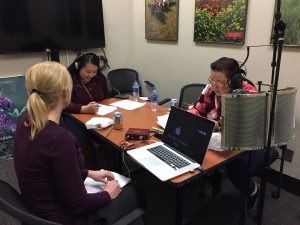
Audio recording for one of the Hmong food safety videos 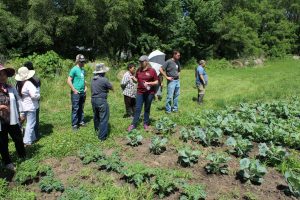
Field day at See Fit Farm, Lakeville MN. Farmers talk about insects, disease, food safety and selling wholesale. 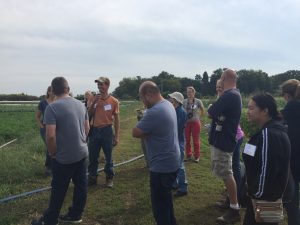
Farmers attend MOSES sponsored field day about postharvest handling and food safety 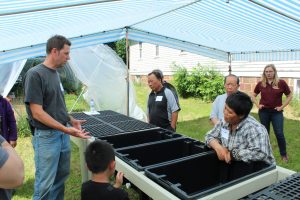
Food safety field day in conjunction with The Good Acre, with washing stand demonstration and construction 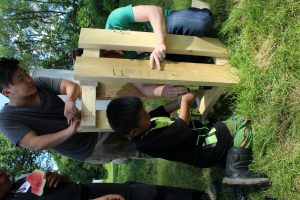
Building a handwashing stand at a farm food safety field day 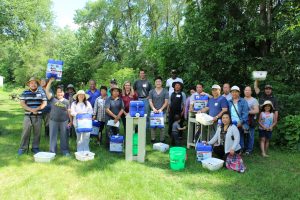
All attendees at a field day at See Fit Farm, MN got to leave with a blue water container, dishpan drawer, soap and paper towel to make their own handwashing stand. One winner got to take home the entire stand that the group built. 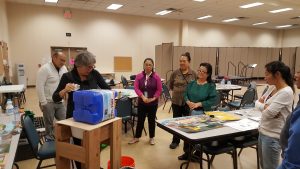
In-class food safety presentation and demonstration of handwashing stand
Learning Outcomes
Farm food safety, handwashing, sanitation, Good Agricultural Practices
Project Outcomes
Impacts
Food safety trainings: The farmers that attended the training workshops were introduced to the basics of food safety, and were very interested in this sort of in-depth assistance (workshops were all translated into Hmong). Some of the concepts were brand new, such as most of the logsheets and records. Some of the practices were familiar, like the importance of handwashing. But no farm currently has a food safety plan or had attended a GAPs workshop previously, so in many ways writing and implementing a food safety plan for their farm will be a completely new challenge.
Capacity building among core group of dedicated farmers who are looking to sell wholesale: It has become clear that identifying the farmers who are motivated to learn about GAPs is the key to successfully implementing a peer to peer project. There are likely about 4-5 Hmong farms that really want to really scale up and sell wholesale that we can identify, so finding and building capacity among these farms is critical. They are very interested in finding new markets beyond farmers markets. Many who sell at farmers markets care about food safety in general, but not enough to develop a food safety plan or even attend a workshop. The peer mentors are now able to offer this information to their peer farmers, encouraging them to attend a food safety workshop/field day led by the mentors.
Importance of partners: The Good Acre will continue to be a very important partner, and they will be present at the workshops. They will act as the "carrot" for farmers, representing a large buyer who will purchase large amounts of product at a fair price, but want the farmers to have a food safety plan. They have even more markets for farmers who pass a GAP audit, and therefore a few farmers will likely go down this path. HAP was a critical partner and liaison with the farmers - calling them to remind them of workshops, answering questions, hosting the meetings etc. HAP staff is also receiving this training, and will now be able to educate farmers about food safety.
Field days for farmers were critical for capacity building: The field days in 2016 and 2017 were some of the most helpful aspects for the farmers. They reported being very interested in the topics and learning very well from the hands-on structure. The field days were in English, but the farmers all speak English well enough to understand the basic concepts. In addition, we paid farmers costs and mileage to attend other field days beyond food safety topics. This incentive was enough to get many farmers to really see out field days, and they said that they were very useful and beneficial to build their capacity as farmers.
New and innovative training ideas: During the project we used innovative techniques, like story telling and acting to talk about concepts. The farmers learned about a concept like handwashing, washing totes and bins, and then were asked to act out a walk-through with their neighbors as if they were telling them about these practices. They worked in pairs and pretended to visit the farm of a friend and ask them all about their food safety, and give advice. The farmers loved this, and it really brought the material to life.
Accomplishments
The planning group of lead Hmong farmers, staff from Hmong American Partnership and the project PI from University of Minnesota Extension met throughout 2016-17 to plan project outcomes and ensure continued momentum.
June 2016 On-Farm Workshop: First educational food safety training with 8 Hmong farmers in attendance on the farm of a Hmong farmer leader. Farmers were given 3-ring binders with a food safety plan template and supporting materials. Project staff and the farmer leader explained the major parts of the food safety plan and simplified log sheets. Most were not keeping records currently. Tour of farm where Hmong leader described how he implements the practices on the farm and answered questions.
Fall 2016 new project partner: An important new connection within this project is The Good Acre food hub in Falcon Heights, MN. The Good Acre buys from Hmong farmers for its CSA including those in this project, and would like to buy more for a wholesale food service account. However, the wholesale account requires a food safety plan and potentially a GAP third-party food safety audit, which the farmers do not currently have. Therefore The Good Acre will help to reiterate the importance of good food safety practices on the farm, and may even help to shepard 1 or 2 of the Hmong farmers through a GAP audit in 2017. It will be very helpful to have a buyer saying that food safety is important and will help the goals of this project and elevate food safety in the minds of the participants.
November 2016 Classroom Workshop at HAP in St. Paul: 5 Hmong farmers in attendance. HAP staff purchased all materials for a portable handwash station and washing bins and we demonstrated how to build it. Project staff and farmer leaders led discussions and hands-on activities focused on washing/sanitizing bins and safe washing protocols for washing veggies. All attendees received measuring spoons for making sanitizer solution and tester strips to measure concentration of sanitizer when they make it at home for sanitizing their food contact surfaces, bins, tools etc.
February 2017 Classroom Workshop at HAP: 9 farmers in attendance. Focus on food safety plan development, records, log sheets and why these things might be important to a buyer. Look at template for food safety plan developed by UMN Extension. Practiced writing an SOP on cleaning and sanitizing bins.
Field days: Farmers attended 5 field days throughout the Minnesota and Wisconsin and were paid a mileage stipend for each one. They said that attending the field days were extremely useful for their operation and empowered farmers to attend these sorts of events in the future. Some of the topics included using a plastic mulch layer, small fruits for the farm, natural pest control and recordkeeping for a small farm.
Food safety plan development for sales to Minneapolis Public Schools: One of the lead farmers began selling to Minneapolis Public Schools, and the project team helped him develop his food safety plan to their specifications.
June 2017 On-Farm Workshop: See Fit Farm, Lakeville MN: 35 farmers attended this workshop, which was held on the farm of an advisory board member. He was able to lead the process and day, encouraging peer farmers to adopt these practices. The participants toured the farm and saw the handwashing, port o potty, and record keeping systems. They also toured another farm on the property and talked about pests, disease and organic sprays. All participants got to leave with a blue 7 gallon tank for handwashing stand, a dishpan, soap and a pack of paper towels as well as the guide to building the stand. The Good Acre was able to provide a low-cost veggie washing stand to the farm, and we highlighted this and farmers asked all about this and how to make one on their farm.
Videos: 4 Hmong lanuage videos, with 2 of the advisory board actors, were shot and edited. The farmers said that they would rather have a video than a written handout/poster as was originally proposed, so that is what we created instead.
Presentations: The farmer advisory board attended and 1 farmer spoke at MOSES organic conference and the Emerging Farmers Conference, Feb 2018.
New markets: One farmer won a contract with Minneapolis public schools, and was able to deliver a large quantity of produce in fewer deliveries, which was a goal of his farm and his family. The farmer won this contract again a second year. The family also now sells to a food hub, and is seeking new markets like like large K-12 districts, but these wholesale markets often require food safety plans or even a food safety audit. Our project team worked closely with him to help him develop his food safety plan, logsheets, and SOPs to describe his cleaning and sanitation. He may seek a GAP audit on product this summer, further opening markets beyond the school district.
Testimonials:
"Food safety is not that hard, but many of my friends think it is scary. One thing I learned is that you don't have to wash your vegetables. I know that many people wash everything, but that water may be dirty. I don't wash unless the vegetable is very dirty.
"I learned that handwashing is so good, and keeps your vegetables clean and germs from making people sick. I have 2 handwashing stands on my farm that (Annalisa and Michele Schermann) helped me learn to build, and my family uses them before we pick the vegetables. I don't want to make someone sick."
"I am very proud of my vegetables and like them to be clean. I don't want anyone to get sick from my healthy food. I am glad to learn about these things."
The peer to peer formal education and walk through process, whereby an advisory board farmer is trained and then goes to do a walk through with their neighbor and talk about food safety that was originally suggested was too difficult and cumbersome to explain and execute. The farmers preferred more simple activities. They liked coming to the workshops, and getting one- on- one advice and help. They then said that they would go into their communities and provide this information on their own.
Building capacity among a few farmers, so that they can share that with their friends, is a good practice and well suited for this community. The farmers were empowered and happy to participate, and felt very proud of learning these concepts.
All projects that work with communities need to include a partner from the community as equal on the budget and project timeline and activities. FLAG, and then HAP was a consistent and critical partner in this work. The workshops, outreach, and activities could not have been created without their dedication and hard work.
If a buyer is requring it, the farmers will do it. So, having the Good Acre, or other buyers asking for practices is critical. Future projects should include direct consult and collaboration with buyers and food hubs, so that messaging and information is consistent.
The videos were created in lieu of formal curriculum or written materials. The farmers said that they appreciated a visual method of learning the materials, and these videos can be used by organizations to provide training for farmers for years to come.